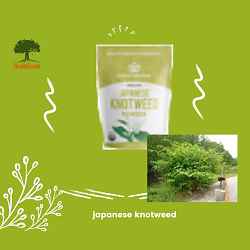JAPANESE KNOTWEED:
What is Japanese Knotweed?
 Japanese knotweed (Fallopia japonica) is a vegetable native to East Asia – particularly, parts of China, Korea, and Japan – and a member of the buckwheat plant family. It has hollow stalks that somewhat resemble bamboo and oval, wide leaves. Japanese knotweed is a healthy grower. It can exceed the height of 10 feet under the reasonable conditions. Due to this spreading pattern and rapid growth rate, various countries worldwide have entitled it an invasive species.
Japanese knotweed (Fallopia japonica) is a vegetable native to East Asia – particularly, parts of China, Korea, and Japan – and a member of the buckwheat plant family. It has hollow stalks that somewhat resemble bamboo and oval, wide leaves. Japanese knotweed is a healthy grower. It can exceed the height of 10 feet under the reasonable conditions. Due to this spreading pattern and rapid growth rate, various countries worldwide have entitled it an invasive species.
In Japanese knotweed’s native areas, people search it to extract resveratrol(a naturally occurring compound) from the roots or to cook with the plant. The stems of Japanese knotweed plants are edible, possessing a somewhat sour taste, while resveratrol might have usage as a dietary supplement.
Edible Parts of Japanese Knotweed
You can harvest a whole Japanese knotweed plant and use several of its elements to make a favourable meal. Here are the parts of the plant that are suitable for your consumption –
- Leaves:You can definitely consume the leaves for nutriment. You can cook them with other vegetables in a pan or enjoy them raw in a salad.
- Roots:You can harvest the most nutrients from Japanese knotweed’s root system, including high concentrations of resveratrol. Thinly slice the roots and stir fry them or prepare them in jams, soups, or chutneys.
- Shoots:From early spring to late summer, it is possible to harvest young shoots from Japanese knotweed plants. Peel back the tough outer layers of the stalks to consume the new shoots raw, or fry them in a pan until they soften and become brown. Raw Japanese knotweed shoots might have a lemony, citrus flavour.
Nutrients
Japanese knotweed is rich in various essential nutrients and vitamins that have potent health benefits –
- Magnesium and potassium are two essential minerals you can find in Japanese knotweed. These minerals work with calcium in your body to enhance joint functionality and build strong bones.
- Japanese knotweed is an extraordinary source of resveratrol, and in many parts of the world, people harvest the plant particularly for resveratrol extraction. You can also find the same compound in red wine and grapes.
- Japanese knotweed contains various essential vitamins, including vitamin A and vitamin C. Both of these nutrients help your body in maintaining a healthy immune system against infection and disease.
Proven Health Benefits
Antioxidant Attributes
The extracts of Japanese knotweed are rich in antioxidants, especially resveratrol. It has shown potential benefits in life span, aging, and skin health. The resveratrol extracted from its roots is used as a dietary supplement for diverse health issues, in beauty products and medicine. Other antioxidant metabolites include flavonoids, catechols, quinines, stilbenes, phenolic acids, and tannins.
Weight Loss
The remarkable amount of resveratrol in the plant may assist with weight loss, when its supplementation is combined with the preferable diet and physical activity. Its mechanism for weight loss owes to its ability to boost metabolism and regulate oestrogen levels. Boosting of metabolism enhances processing of food consumed and hampers body fat storage, and maintaining oestrogen levels will help you build muscles.
Antimicrobial Activity
Extracts of Japanese knotweed leaves found to contain components  such as rutin, quercetin, and epicatechin that indicate antimicrobial attributes.
such as rutin, quercetin, and epicatechin that indicate antimicrobial attributes.
Cardiovascular Benefits
The resveratrol content of the plant may possess anticoagulant features by decreasing blood density. It may also assist in aiding heart disorders like myocardial obstructions by preventing embolisms and blood clots.
Lipid-Lowering Effects
Some studies have reported that bioactive compounds, namely emodin and polydatin assist in reducing lipid levels and may also provide liver-protective benefits.
Recipes
Apart of its therapeutic uses, the culinary uses of the plant are diverse. Japanese knotweed is used as a replacement for rhubarb in dishes. The juice of its rhizome is used in the making of rice flour and to make Itadori Tea (meaning “well-being” in Japanese). Because of its rich resveratrol content, the tea can be used to replace red wine.
Honey from Japanese knotweed is globally famous. Honey is attained from the flowers and is also reviewed for its chemical form and bioactive features.
And the roots of the plant are used to make beverages in Korea.
The Takeaway
Japanese knotweed has been used as a treatment in traditional medication systems for thousands of years. Studies and reviews suggest that this herb provides anti-inflammatory benefits and various other therapeutic effects to your health.
If you’re interested in using Japanese knotweed or its supplementations, it is necessary to get advice from a healthcare professional who is familiar with herbal medicines. They can assist you determine whether Japanese knotweed supplements prove to be beneficial, safe, and is a healthy addition to your daily lifestyle and diet.
